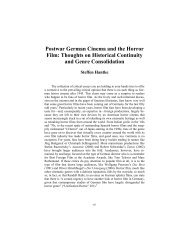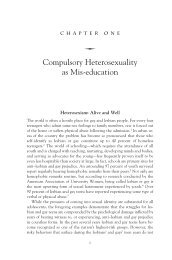Historical Dictionary of the Gypsies (Romanies) - Scarecrow Press
Historical Dictionary of the Gypsies (Romanies) - Scarecrow Press
Historical Dictionary of the Gypsies (Romanies) - Scarecrow Press
Create successful ePaper yourself
Turn your PDF publications into a flip-book with our unique Google optimized e-Paper software.
Introduction<br />
Describing <strong>the</strong> early history <strong>of</strong> <strong>the</strong> <strong>Gypsies</strong> is like putting toge<strong>the</strong>r a jigsaw<br />
puzzle when some <strong>of</strong> <strong>the</strong> pieces are missing and parts <strong>of</strong> ano<strong>the</strong>r<br />
puzzle have been put into <strong>the</strong> box. The <strong>Gypsies</strong> suddenly appeared in<br />
Europe speaking an Indian language, yet <strong>the</strong>re is no sure trace <strong>of</strong> <strong>the</strong>ir<br />
passage across <strong>the</strong> Middle East. But <strong>the</strong>ir language is <strong>the</strong> key to <strong>the</strong><br />
route <strong>of</strong> <strong>the</strong>ir travels as <strong>the</strong>y borrowed words from <strong>the</strong> various peoples<br />
<strong>the</strong>y met as <strong>the</strong>y journeyed west.<br />
The <strong>Gypsies</strong>, or <strong>Romanies</strong>, are an ethnic group that arrived in Europe<br />
around <strong>the</strong> 14th century. Scholars argue about when and how <strong>the</strong>y left<br />
India, but it is generally accepted that <strong>the</strong>y did emigrate from nor<strong>the</strong>rn<br />
India sometime between <strong>the</strong> 6th and 11th centuries, <strong>the</strong>n crossed <strong>the</strong><br />
Middle East and came into Europe. Some stayed in <strong>the</strong> Middle East.<br />
The Nawwar in particular are mentioned in <strong>the</strong> dictionary. Their language<br />
(closely related to European Romani) also belongs to <strong>the</strong> North<br />
Indian group, alongside Hindi and Punjabi.<br />
The word Gypsy is an abbreviation <strong>of</strong> “Egyptian,” <strong>the</strong> name by<br />
which <strong>the</strong> Romany immigrants were first called in western Europe because<br />
it was believed <strong>the</strong>y came from Egypt. The French word gitan<br />
and Spanish gitano also come from this etymology. The German word<br />
Zigeuner and Slav tsigan or cigan have a different source. They come<br />
from <strong>the</strong> Greek word athinganos, meaning “hea<strong>the</strong>n.” This term was<br />
originally used <strong>of</strong> a heretical sect in Byzantium and, because <strong>the</strong> <strong>Gypsies</strong><br />
who arrived in Europe were not Christians, <strong>the</strong>y were given <strong>the</strong><br />
name <strong>of</strong> this sect.<br />
The <strong>Gypsies</strong>’ name for <strong>the</strong>mselves is Rom (with <strong>the</strong> plural Roma in<br />
most dialects). This is generally considered to be cognate with <strong>the</strong> Indian<br />
word dom, whose original meaning was “man.” Even groups (such<br />
as <strong>the</strong> Sinti) that do not call <strong>the</strong>mselves Rom still preserve this word in<br />
<strong>the</strong>ir dialect in <strong>the</strong> sense <strong>of</strong> “husband.”<br />
xxxvii
















